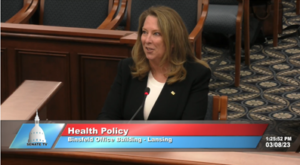
 The Michigan House of Representatives acted on a pair of MHA-supported bills during the week of March 20.
The Michigan House of Representatives acted on a pair of MHA-supported bills during the week of March 20.
In the House Health Policy Committee, members voted to report legislation to strengthen Michigan’s Healthy Michigan statute. House Bill (HB) 4224, introduced by Rep. Julie Rogers (D-Kalamazoo), would remove Michigan’s Medicaid work requirements that are currently held up by the courts. The MHA has provided testimony in support of the bill and expects additional improvements to the Healthy Michigan statute to be introduced in the coming weeks. HB 4224 now awaits a floor vote by the full House of Representatives and the MHA will continue to monitor any action in future Monday Report articles.
Another MHA-supported bill, HB 4167, was passed by the full House of Representatives and transmitted to the Senate for further consideration. Introduced by Rep. Jason Morgan (D-Ann Arbor), HB 4167 would establish a new rare disease advisory council at the Department of Health and Human Services to provide guidance on research, diagnosis and treatment efforts in Michigan. The MHA hopes this council will help identify opportunities to improve care for the one in 10 U.S. residents impacted by rare diseases according to the National Institutes of Health.
In the other chamber, Sen. Sylvia Santana (D-Detroit) introduced a new bill intended to increase access to vaccines and certain laboratory tests. Senate Bill (SB) 219 would allow for pharmacists to order and administer vaccinations and certain diagnostic tests for their patients without physician supervision. Under the bill, the diagnostic tests pharmacists would be allowed to perform would be limited to those waived for home use by the Food and Drug Administration or approved for waiver under the Clinical Laboratory Improvement Amendments of 1988 (CLIA). The MHA has not taken a position on SB 219, which has been referred to the Senate Health Policy Committee.
Legislators will now return to their districts for a two-week break from session before returning to focus on the fiscal year 2024 state budget.
Members with questions about state legislative action can reach out to Adam Carlson for more information.

